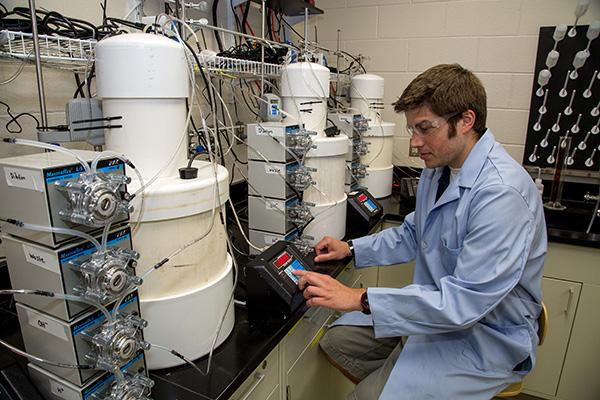WIST Laboratory Services Working with Siemens on R&D
Aim is sustainable water technology for oil and gas industry
A research project underway by the Wisconsin Institute for Sustainable Technology (WIST) will help global company Siemens provide sustainable water technology to the oil and gas industry.
Siemens, with €75.9 billion in revenue at the end of fiscal 2013, ranks as one of the world’s largest corporations and is a major force in water technology and engineering. Its facility in Rothschild, Wisconsin employs about 150 people, and is the global headquarter for research and development activities associated with treating water in the Oil and Gas Industry, just 20 minutes up the Interstate from Stevens Point and WIST.
“This project is going to help Siemens in its efforts to develop sustainable processes to recapture and re-use water at oil and gas processing operations around the world,” said Bill Cunningham, manager for biological processes and products for Siemens in Rothschild.
In the oil and gas world, crude oil contains a fair amount of water when it arrives to be refined, and water is actually used to wash the crude to remove salts, Cunningham explained. In treating the water, the oil is first removed. Then dissolved organic and inorganic compounds that remain in the water are typically removed with a biological treatment process.
“Sometimes the water temperature is elevated and needs to be cooled before it can be effectively treated,” Cunningham said. “The current research that is going to go on with WIST at UWSP is to help define for us what the optimum temperature ranges are for different degrees of treatment and different substrates, including organic and inorganic compounds that have to be removed by the biology.”
WIST is an institute within the College of Natural Resources at the University of Wisconsin-Stevens Point. It works entrepreneurially to connect the university’s expertise to business and industry.
Justin Hall, WIST instrumentation specialist, helped plan the project, designed equipment needed for the work, and is performing the experiments. As a UW-Stevens Point graduate in water resources, Hall is excited to be working on a project so closely aligned with his education and interests.
“I’ve always had a passion for water and water quality,” Hall said. “That stems back to me growing up on Lake Michigan. I spent a lot of time as a kid there.”
John Baldus, WIST laboratory services director, said that the Siemens work will be done in the UW-Stevens Point Waste Education Center, a two-year-old facility that includes a pilot wastewater treatment plant as well as bench top laboratory space.
“WIST investment in system controls and laboratory equipment will support industrial research, and make the facility available for industrial use,” Baldus said. “This updates the Waste Education Center for real world application testing with a global leader in this market segment.”
Both WIST and Siemens see this first project as just the beginning of what they hope becomes a long-term relationship.
Cunningham said Siemens sometimes has demands for short-term research efforts but often the capacity for that research has been taken up by longer-term projects at its Rothschild facility.
“So it’s critically important that we have, one, a place to go to where we can have some of these short-term research efforts undertaken and not be delayed by our current research project commitments,” Cunningham said. “And secondly, where we can do it at a place where we can train up students at the undergraduate or the graduate level and hopefully, long-term relationships develop and this becomes a feeder source for our future employment candidates as well.”
Because Siemens will provide oversight and guidance on the projects, Baldus sees opportunities for mentoring for WIST employees and student staff.
“They operate in a global environment, and our campus and student staff get exposure to it,” Baldus said.
“Siemens may be global, but having a local resource like WIST means we can undertake a greater volume of research with our current research staffing, and help develop the talent we’ll need to rely on in the years to come.” Cunningham said. “If it wasn’t happening locally here we would be forced to look elsewhere, including out of state universities, principally in the Gulf Coast region.”
About The Wisconsin Institute for Sustainable Technology
The Wisconsin Institute for Sustainable Technology (WIST) provides research, laboratory services and education to help businesses and organizations accomplish their goals in ways that make more sustainable use of natural resources. Technology and ideas developed by WIST and its partners will spur economic growth and help preserve a healthy environment for future generations. WIST is a multidisciplinary institute at the University of Wisconsin-Stevens Point with support from the UWSP College of Natural Resources and the College of Letters and Science.



